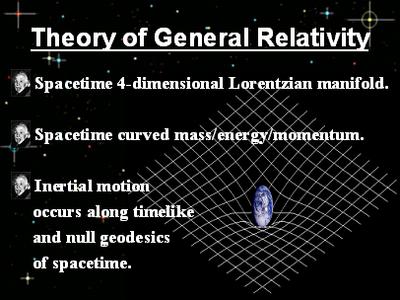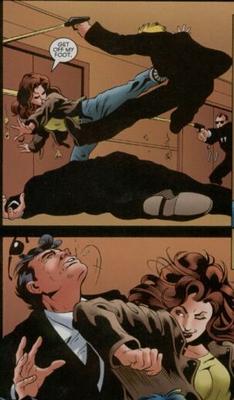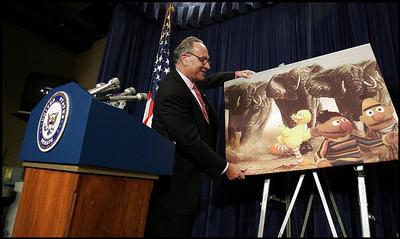The complete text of the final draft Iraqi Constitution, as translated from the Arabic by The Associated Press. Differences between this text and the version Aug. 22 are in parentheses:
PREAMBLE
We the sons of Mesopotamia, land of the (messengers), prophets, resting place of the holy imams, the leaders of civilization and the creators of the alphabet, the cradle of arithmetic: on our land, the first law put in place by mankind was written; in our nation, the most noble era of justice in the politics of nations was laid down; on our soil, the followers of the prophet and the saints prayed, the philosophers and the scientists theorized and the writers and poets created.
Recognizing God's right upon us; obeying the call of our nation and our citizens; responding to the call of our religious and national leaders (and our national forces and politicians) and the insistence of our great religious authorities and our leaders and our reformers, we went by the millions for the first time in our history to the ballot box, men and women, young and old, on Jan. 30, 2005, remembering the pains of the despotic band's sectarian oppression; inspired by the suffering of Iraq's martyrs -- Sunni and Shiite, Arab, Kurd and Turkomen, and the remaining brethren in all communities -- inspired by the injustice against the holy cities (and the south) in the popular uprising and (burnt with the sorrows of the mass graves, the marches and Dujail and others); recalling the agonies of the national oppression in the massacres of Halabja, Barzan, Anfal and against the Faili Kurds; inspired by the tragedies of the Turkomen in Bashir, and as in other parts of Iraq, (the people of the western region have suffered from the liquidation of its leaders, symbols, tribal leaders and displacing its intellectuals, so we worked hand in hand and shoulder to shoulder) to create a new Iraq, Iraq of the future, without sectarianism, racial strife, regionalism, discrimination and (elimination).
Terrorism and "takfir" (Editors Note: takfir means to declare someone an infidel) did not divert us from moving forward to build a nation of law. Sectarianism and racism did not stop us from marching together to strengthen our national unity, set ways to peacefully transfer power, adopt a manner to fairly distribute wealth and give equal opportunity to all.
We the people of Iraq, newly arisen from our disasters and looking with confidence to the future through a democratic, federal, republican system, are determined -- men and women, old and young -- to respect the rule of law, reject the policy of aggression, pay attention to women and their rights, the elderly and their cares, the children and their affairs, spread the culture of diversity and defuse terrorism.
We are the people of Iraq, who in all our forms and groupings undertake to establish our union freely and by choice, to learn yesterday's lessons for tomorrow, and to write down this permanent constitution from the high values and ideals of the heavenly messages and the developments of science and human civilization, and to adhere to this constitution, which shall preserve for Iraq its free union of people, land and sovereignty.
CHAPTER ONE: BASIC PRINCIPLES
Article (1): The Republic of Iraq is an independent, sovereign nation, and the system of rule in it is a democratic, federal, representative (parliamentary) republic.
Article (2):
1st -- Islam is the official religion of the state and is a basic source of legislation:
(a) No law can be passed that contradicts the undisputed rules of Islam. (b) No law can be passed that contradicts the principles of democracy. (c) No law can be passed that contradicts the rights and basic freedoms outlined in this constitution.
2nd -- This constitution guarantees the Islamic identity of the majority of the Iraqi people and the full religious rights for all individuals and the freedom of creed and religious practices like (Christians, Yazidis, Sabaean Mandeans.)
Article (3): Iraq is a multiethnic, multi-religious and multi-sect country. It is part of the Islamic world and its Arab people are part of the Arab nation.
Article (4):
1st -- Arabic and Kurdish are the two official languages for Iraq. Iraqis are guaranteed the right to educate their children in their mother tongues, such as Turkomen or Assyrian (and Armenian), in government educational institutions, or any other language in private educational institutions, according to educational regulations.
2nd -- the scope of the phrase "official language" and the manner of implementing the rules of this article will be defined by a law that includes:
(a) issuing the official gazette in both languages. (b) speaking, addressing and expressing in official domains, like the parliament, Cabinet, courts and official conferences, in either of the two languages. (c) recognition of official documents and correspondences in the two languages and the issuing of official documents in them both. (d) the opening of schools in the two languages in accordance with educational rules. (e) any other realms that require the principle of equality, such as currency bills, passports, stamps.
3rd -- Federal agencies and institutions in the region of Kurdistan use both languages.
4th -- The Turkomen and Assyrian (are two other languages that will be official in administrative areas where those groups are located in large numbers.)
5th -- Any region or province can take a local language as an additional official language if a majority of the population approves in a universal referendum.
Article (5): The law is sovereign, the people are the source of authority and its legitimacy, which they exercise through direct, secret (general) ballot and its constitutional institutions.
Article (6): Government should be rotated peacefully through democratic means stipulated in this constitution.
Article (7):
1st -- Entities or trends that advocate, instigate, justify or propagate racism, terrorism, "takfir" (Editors Note: takfir means to declare someone an infidel), sectarian cleansing, are banned, especially the Saddamist Baath (eliminates the word Party from previous text) in Iraq and its symbols, under any name. It will be not be allowed to be part of the multilateral political system in Iraq, which should be defined according to the law.
2nd -- The state will be committing to fighting terrorism in all its forms and will work to prevent its territory from being a base or corridor or an arena for its (terrorism's) activities.
Article (8): Iraq shall abide by the principles of good neighborliness and by not intervening in the internal affairs of the other countries, and it shall seek to peacefully resolve conflicts and shall establish its relations on the basis of shared interests and similar treatment and shall respect its international obligations.
Article (9):
1st -- (a) The Iraqi armed forces and security apparatuses consist of the components of the Iraqi people, keeping in consideration their balance and representation without discrimination or exclusion. They fall under the command of the civil authority, defend Iraq, don't act as a tool of oppression of the Iraqi people, don't intervene in political affairs and they play no role in the rotation of power.
(b) Forming military militias outside the framework of the armed forces is banned. (c) The Iraqi armed forces and its personnel -- including military personnel working in the Defense Ministry and in any offices or organizations subordinate to it -- are not allowed to run as candidates in elections for political office. They should not engage in election campaigning for candidates and should not take part in activities forbidden by the regulations of the Defense Ministry. This ban includes the activities of the previously mentioned individuals acting in their personal or professional capacities, but does not include their right to vote in the elections.
d) The Iraqi national intelligence service shall gather information and assess threats to national security and offers advice to the Iraqi government. It is under civilian control; it is subjected to the supervision of the executive authority; it operates according to the law and to recognized human rights principles.
e) The Iraqi government shall respect and implement Iraq's international commitments regarding the nonproliferation, non-development, non-production, and non-use of nuclear, chemical, and biological weapons. Associated equipment, material, technologies, and communications systems for use in the development, manufacture, production, and use of such weapons shall be banned.
2nd -- Military service shall be regulated by a law.
Article (10): The holy shrines and religious sites in Iraq are religious and cultural entities. The state is committed to maintain and protect their sanctity and ensure the exercising of (religious) rites freely in them.
Article (11): Baghdad is the capital of the republic of Iraq.
Article (12):
1st -- The flag, emblem and national anthem of Iraq shall be fixed by law in a way that symbolizes the components of the Iraqi people.
2nd -- Medals, official holidays, religious and national occasions and the (Islamic and Christian) calendars shall be fixed by law.
Article (13):
1st -- This constitution shall be considered as the supreme and highest law in Iraq. It shall be binding throughout the whole country without exceptions.
2nd -- No law that contradicts this constitution shall be passed; any passage in the regional constitutions and any other legal passages that contradict this constitution shall be considered null.
CHAPTER TWO: RIGHTS AND FREEDOMS
PART ONE: RIGHTS
FIRST: Civil and political rights.
Article (14): Iraqis are equal before the law without discrimination because of sex, ethnicity, nationality, origin, color, religion, sect, belief, opinion or social or economic status.
Article (15): Every individual has the right to life and security and freedom, and cannot be deprived of these rights or have them restricted except in accordance to the law and based on a ruling by the appropriate judicial body.
Article (16): Equal opportunity is a right guaranteed to all Iraqis, and the state shall take the necessary steps to achieve this.
Article (17):
1st -- Each person has the right to personal privacy as long as it does not violate the rights of others or general morality.
2nd -- The sanctity of the home is protected. They cannot be entered or searched or violated except by judicial decision and in accordance with the law.
Article (18):
1st -- An Iraqi is anyone who has been born to an Iraqi father or an Iraqi mother.
2nd -- Iraqi nationality is a right to all Iraqis and it is the basis of their citizenship.
3rd -- (a) It shall be forbidden to withdraw the Iraqi citizenship from an Iraqi by birth for any reason. Those who have had their citizenship withdrawn have the right to reclaim it and this should be regulated by law.
(b) Iraqi citizenship shall be withdrawn from naturalized citizens in cases stated by law.
4th -- Every Iraqi has the right to carry more than one citizenship. Those who take a leading or high-level security position must give up any other citizenship. This shall be regulated by law.
5th -- Iraqi citizenship may not be granted for the purposes of a policy of population settlement disrupting the demographic makeup in Iraq.
6th -- Citizenship regulations shall be determined by law, and the proper courts should hear suits arising from the regulations.
Article (19):
1st -- The judiciary is independent, with no power above it other than the law.
2nd -- There is no crime and no punishment except by the text (Editors Note: of law). And there is no punishment except for an act that the law considers a crime at the time of its commission. No punishment can be enacted that is heavier than the punishment allowed at the time of the crime's commission.
3rd -- Trial by judiciary is a right protected and guaranteed to all.
4th -- The right to defense is holy and guaranteed in all stages of investigation and trial.
5th -- The accused is innocent until his guilt is proven in a just, legal court. The accused cannot be tried for the same accusation again after he has been freed unless new evidence appears.
6th -- Every individual has the right to be treated in a just manner in all judicial and administrative procedures.
7th -- Court sessions will be open unless the court decides to make them secret.
8th -- Punishment is for individuals.
9th -- Laws do not apply retroactively unless otherwise has been legislated, and this exception does not include laws of taxes and duties.
10th -- Punitive law shall not be applied retroactively unless it is best for the defendant.
11th -- The court shall appoint an attorney to defend defendants charged with a felony or a misdemeanor who don't have an attorney and it shall be at the state's expense.
12th -- (a) (Arbitrary) detention shall not be allowed.
(b) Arrest or imprisonment is not allowed in places other than those designated for that according to prison laws that are covered by health and social services and are under the control of the state.
13th -- Preliminary investigation papers shall be shown to the concerned judge no later than 24 hours from the time of the detention of the accused and cannot be extended except once and for same duration.
Article (20): Citizens, male and female, have the right to participate in public matters and enjoy political rights, including the right to vote and run as candidates.
Article (21):
1st -- An Iraqi shall not be handed over to foreign bodies and authorities.
2nd -- Political asylum to Iraq shall be regulated by law and the political refugee shall not be turned over to a foreign body or forcefully returned to the country from which he has fled.
3rd -- Political asylum shall not be granted to those accused of committing international or terror crimes or to anyone who has caused Iraq harm.
SECOND: Economic, social and cultural rights
Article (22):
1st -- Work is a right for all Iraqis in a way that guarantees them a good life.
2nd -- The law regulates the relation between employees and employers on an economic basis, while keeping in consideration rules of social justice.
3rd -- The state guarantees the right to (found or) join syndicates or professional unions. This shall be regulated by law.
Article (23):
1st -- Private property is protected and the owner has the right to use it, exploit it and benefit from it within the boundaries of the law.
2nd -- Property may not be taken away except for the public interest in exchange for fair compensation. This shall be regulated by law.
3rd-- (a) An Iraqi has the right to ownership anywhere in Iraq and no one else has the right to own real estate except what is exempted by law.
(b) Ownership with the purpose of demographic changes is forbidden.
Article (24): The state shall guarantee the freedom of movement for workers, goods and Iraqi capital between the regions and the provinces. This shall be regulated by law.
Article (25): The state shall guarantee the reforming of the Iraqi economy according to modern economic bases, in a way that ensures complete investment of its resources, diversifying its sources and encouraging and developing the private sector.
Article (26): The country shall guarantee the encouragement of investments in the different sectors. This shall be regulated by law.
Article (27):
1st -- Public property is sacrosanct, and its protection is the duty of every citizen.
2nd -- Regulations pertaining to preserving and administrating state property, the conditions set for using it and the cases when giving up any of the property may be allowed shall be regulated by law.
Article (28):
1st -- Taxes and fees shall not be imposed, amended, collected or eliminated except by law.
2nd -- Low-income people should be exempted from taxes in a way that guarantees maintaining the minimum level necessary for a living. This shall be regulated by law.
Article (29):
1st-- (a) The family is the foundation of society and the state should preserve its (Editors Note: the family's) existence and ethical and religious value.
(b) The state shall guarantee the protection of motherhood, childhood and old age and shall take care of juveniles and youths and provide them with agreeable conditions to develop their capabilities.
2nd -- Children have the right to upbringing, education and care from their parents; parents have the right to respect and care from their children, especially in times of want, disability or old age.
3rd -- Economic exploitation of children in any form is banned and the state shall take measures to guarantee their protection.
4th -- Violence and abuse in the family, school and society shall be forbidden.
Article (30):
1st -- The state guarantees social and health insurance, the basics for a free and honorable life for the individual and the family -- especially children and women -- and works to protect them from illiteracy, fear and poverty and provides them with housing and the means to rehabilitate and take care of them. This shall be regulated by law.
(2nd -- The state guarantees the social well-being and health care for Iraqis in case of old age, sickness, disability, becoming a refugee or orphan, or unemployment; works to protect them from ignorance, fear and poverty; provides them with housing and rehabilitation; and takes care of them. This shall be regulated by law.)
Article (31):
1st -- Every Iraqi has the right to health services, and the state is in charge of public health and guarantees the means of protection and treatment by building different kinds of hospitals and health institutions.
2nd -- Individuals and associations have the right to build hospitals, dispensaries or private clinics under the supervision of the state. This shall be regulated by law.
Article (32): The state cares for the disabled and those with special needs and guarantees their rehabilitation to integrate them in society. This shall be regulated by law.
Article (33):
1st -- Every individual has the right to live in a correct environmental atmosphere.
2nd -- The state guarantees protection and preservation of the environment and biological diversity.
Article (34):
1st -- Education is a main factor for the progress of society and it is a right guaranteed by the state. It is mandatory in the primary school and the state guarantees fighting illiteracy.
2nd -- Free education is a right for Iraqis in all its stages.
3rd -- The state encourages scientific research for peaceful purposes in a way that benefits humanity and it promotes excelling, creativity and the different manifestations of excellence.
4th -- Private and national education is guaranteed and regulated by law.
PART TWO: Freedoms
Article (35):
1st -- (a) The freedom and dignity of a person are protected.
(b) No one may be detained or investigated unless by judicial decision. (c) All forms of torture, mental or physical, and inhuman treatment are forbidden. There is no recognition of any confession extracted by force or threats or torture, and the injured party may seek compensation for any physical or mental injury that is inflicted.
2nd -- The state is committed to protecting the individual from coercion in thought, religion or politics.
3rd -- Forced labor, slavery and the commerce in slaves is forbidden, as is the trading in women or children or the sex trade.
Article (36): The state guarantees, as long as it does not violate public order and morality:
1st -- the freedom of expressing opinion by all means.
2nd -- the freedom of press, publishing, media and distribution.
3rd -- freedom of assembly and peaceful protest will be organized by law.
Article (37):
1st -- Freedom to establish and belong to political organizations and parties is guaranteed, and it will be organized by law.
2nd -- No person can be forced to join or remain a member of a political party or organization.
Article (38): The freedom of communications and exchanges by post, telegraph, telephone and by electronic and other means is guaranteed. They will not be monitored or spied upon or revealed except for legal and security necessity in accordance with the law.
Article (39): Iraqis are free in their adherence to their personal status according to their own religion, sect, belief and choice, and that will be organized by law.
Article (40): Every individual has freedom of thought, (conscience and ideology.)
Article (41):
1st -- The followers of every religion and sect are free in:
(a) the practice of their religious rites, including the Husseiniya Rites (Editors Note: these are Shiite rites.) (b) the administration of religious endowments and their affairs and their religious institutions, and this will be organized by law.
2nd -- The state guarantees freedom of worship and the protection of its places.
Article (42):
1st -- The Iraqi citizen has freedom of movement and travel and residence within Iraq and outside it.
2nd -- No Iraqi can be exiled or forced out or forbidden to return to his nation.
Article (43):
1st -- The state is keen to strengthen the role of civil society groups and to support, develop them and preserve their independence in accordance with peaceful means to realize legitimate goals. This shall be regulated by law.
2nd -- The state is keen to advance Iraqi tribes and clans and it cares about their affairs in accordance with religion, law and (enhances its noble) human values and in a way that contributes to developing society and it forbids tribal customs that run contrary to human rights.
Article (44): All individuals have the right to enjoy the rights stated in international human rights agreements and treaties endorsed by Iraq that don't run contrary to the principles and rules of this constitution.
Article (45): Restricting or limiting any of the freedoms and liberties stated in this constitution may only happen by, or according to, law and as long as this restriction or limitation does not undermine the essence of the right or freedom.
CHAPTER THREE: THE FEDERAL AUTHORITIES
Article (46): Federal authorities are made up of legislative, executive and judicial authorities and practice their specialties and duties on the basis the separation of power.
PART ONE: THE LEGISLATIVE AUTHORITY.
Article (47): The federal legislative authority is made up of the Council of Representatives and the Council of Union.
FIRST: The Council of Representatives (Parliament).
Article (48):
1st -- The Council of Representatives is made up of a number of members at a proportion of one seat for every 100,000 people from the population of Iraq. They represent the entire Iraqi people and are elected by general, direct, secret ballot, and they take care to represent all groups of people.
2nd -- A candidate for membership in the Council of Representatives must be a fully qualified Iraqi.
3rd -- Conditions for candidates and voters and everything connected to elections will be regulated by law.
4th -- The Council of Representatives will promulgate a law dealing with how to replace its members when they resign or are removed or die.
5th -- It is not permitted to hold membership in the Council of Representatives and another official position.
Article (49): Members of the Council of Representatives shall take the constitutional oath in front of the council before starting their work, as follows:
"I swear by God almighty to carry out my legal duties and responsibilities with dedication and devotion and to preserve the independence and sovereignty of Iraq and to look after the interests of its people and to see to the safety of its land, sky, water, wealth and democratic, federal system and to work to preserve the public and private freedoms and the independence of the judiciary and to abide by honestly and impartially implementing the legislation. God is the witness of what I say."
Article (50): The Council of Representatives shall establish an internal system to regulate its work.
Article (51):
1st -- The Council of Representatives should determine the correctness of the membership of a member by a two-third majority within 30 days of the registering of an objection.
2nd -- The council's decision may be challenged before the Supreme Federal Court within 30 days of the day it was issued.
Article (52):
1st -- Sessions of the Council of Representatives shall be public unless it is necessary to do otherwise.
2nd -- Session reports shall be published in the way the council sees fit.
Article (53): The president of the republic calls on the council to convene by a presidential decree within 15 days of the date that the results of the general elections have been certified. The session shall be held under the chairmanship of the oldest member, to elect the president of the council and his deputies. Extensions for more than the previously mentioned period are not allowed.
Article (54): In its first session, the council shall elect by absolute majority its president, then a first deputy and a second deputy by direct, secret balloting.
Article (55):
1st -- The duration of the council's cycle is four calendar years, starting with the first session and ending by the end of the fourth year.
2nd -- The election of a new Council of Representatives takes place 45 days before the cycle ends.
Article (56): The Council of Representatives has two legislative seasons a year, running for eight months. Internal rules will determine how they shall be held. The season in which the general budget is submitted to the council shall not end before it is approved.
Article (57):
1st -- The president of the republic, the prime minister, the president of the Council of Representatives or 50 members of the council may call for an extraordinary session, and the meeting shall be confined to the issues that have made it necessary to call for the session.
2nd -- The legislative season for the Council of Representatives may be extended for no longer than 30 days to accomplish the tasks that require this, based on a request from the president of the republic, the prime minister, the president of the Council of Representatives or 50 members.
Article (58):
1st -- Quorum for sessions of the Council of Representatives shall be reached by the attendance of the absolute majority of its members.
2nd -- Decisions shall be made in the Council of Representatives by simple majority, (as long as it has achieved the required attendance and) as long as it has not been stated otherwise.
Article (59):
The Council of Representatives is given the following duties:
1st -- Legislating federal laws.
2nd -- Overseeing the performance of the executive authority.
3rd -- Certifying treaties or international agreements by a two-thirds majority of the members of the Council of Representatives, as will be regulated by law.
(4th -- Electing the president of the Republic)
5th-- Approving the appointments of:
(a) the head and members of the Federal Cassation Court, the head of the General Prosecutors Office and the head of the Judiciary Inspection Department by absolute majority, based on the recommendation of the Supreme Judicial Council. (b) ambassadors and those with special ranks, based on the recommendation of the Cabinet. (c) the army chief of staff, his deputies and those who hold the title of division leader and up, the head of the intelligence service, based on the recommendation of the Cabinet.
6th -- (a) Questioning the president of the republic based on a request that mentions the reason for questioning, passed by an absolute majority of the Council of Representatives.
(b) Relieving the president of the republic of his duties by absolute majority of the members of the Council of Representatives after he has been convicted from the Supreme Federal Court in one of the following cases:
1 -- Violating the constitutional oath.
2 -- Violating the constitution.
3 -- Grand treason.
7th-- (a) A member of the Council of Representatives has the right to ask the prime minister and the ministers questions about any subject that falls under any their specialties, and each has the right to answer the members. He/she who asks the question is the only one who has the right to comment on the answer.
(b) At least 25 members of the Council of Representatives may propose a general topic for discussion to clarify the policy or performance of the Cabinet or one of the ministries, and it is then presented to the president of the Council of Representatives, and the prime minister or the ministers set a date to come before the Council of Representatives to discuss it. (c) A member of the Council of Representatives, with the approval of 25 members, may direct an interpellation to the prime minister or the ministers to hold them accountable for the affairs under their specialty. Discussing the interpellation may not take place before seven days from the date it was submitted.
8th -- (a) The Council of Representatives may withdraw confidence from a minister by absolute majority, and he/she is considered (resigned) from the date of the withdrawal of confidence. The issue of confidence in a minister can only be put forth at his request or because of a request signed by 50 members as a result of discussing an interpellation directed to him. The council may not decide on the request except after at least seven days from the day it has been submitted.
(b)
1 -- The president of the republic may submit a request to the Council of Representatives to withdraw confidence from the prime minister.
2 -- The Council of Representatives, based on a request from one-fifth of its members, may vote to withdraw confidence from the prime minister. This request may not be submitted except after an interpellation directed to the prime minister and after at least seven days from the submission of the request.
3 -- The Council of Representatives decides the withdrawal of confidence from the prime minister by absolute majority of its members.
(c) The Cabinet shall be (considered resigned) in the case that confidence is withdrawn from the prime minister. (d) In the case of a vote withdrawing confidence from the whole Cabinet, the prime minister and ministers remain in their positions to run the daily affairs for a period no longer than 30 days until a new Cabinet is formed (in accordance with article 74 in this constitution). (e) The Council of Representatives has the right to question and relieve the officials of independent associations from their duties according to the procedures relating to the ministers and by absolute majority.
9th -- (a) Approving the declaration of war and a state of emergency by a two-thirds majority, based on a joint request by the president of the republic and the prime minister.
(b) The state of emergency may be declared for 30 days, which may be extended by approving it each time. (c) The prime minister shall be given the necessary powers to enable him to run the country's affairs during the period of a declaration of war or a state of emergency. These powers shall be regulated by law in a way that does not run contrary to the constitution. (d) The prime minister presents to the Council of Representatives the measures adopted and the results during the period of a declaration of war or a state of emergency within 15 days from the time they have ended.
Article (60):
1st -- The Cabinet presents the general budget bill and the final accounting statement to the Council of Representatives for approval.
2nd -- The Council of Representatives has the right to rearrange between the parts of the general budget, reduce its total amount of money and it may, when necessary, propose to the Cabinet to increase general costs.
Article (61):
1st -- The rights and privileges given to the president of the Council of Representatives and his deputies and the members of the council shall be fixed by law.
2nd--
a) A member of the Council of Representatives enjoys impunity that covers the opinions he expresses during the time of convening (Editors Note: the council); he shall not be sued before courts for this.
b) A member may not be arrested during the duration of the council's cycle unless he is accused of a felony and by the approval of the absolute majority of the members that he be stripped of his immunity or if he was arrested red-handed.
Article (62):
1st -- The Council of Representatives shall be dissolved by the absolute majority of its members, based on a request from third of its members or a request from the prime minister and with the approval of the president of the republic. The council may not be dissolved while interpellating the prime minister.
2nd -- The president of the republic calls for a general election in the country no later than 60 days after the council of representatives has been dissolved. In that case, the Cabinet is considered (resigned) and it continues to run the daily affairs.
SECOND: The Council of Union.
Article (63):
1st -- A legislative council called the "Council of Union" will be established and will include representatives of regions and provinces (that are not part of a region. The makeup of the council, the conditions for membership, specialties and all things related to it will be organized by law regulated by the majority of two thirds of the Council of Deputies.)
PART TWO: THE EXECUTIVE AUTHORITY
Article (64): The federal executive authority consists of the president of the republic and the Cabinet. It carries out its authorities based on the constitution and the law.
FIRST, The President.
Article (65): The president of the republic is the president of the country and the symbol of the nation's unity and represents the sovereignty of the country and oversees the guarantees of adherence to the constitution, the preservation of Iraq's independence and unity and the security of its territory, in accordance with the law.
Article (66): The candidate for the president's post must:
1st -- be Iraqi by birth from Iraqi parents.
2nd -- be legally competent and have reached the age of 40.
3rd -- have a good reputation and political experience and be known for his integrity, rectitude, justice and devotion to the homeland.
4th -- not have been convicted of a crime that violates honor.
Article (67):
1st -- The rules of nomination for the president's post shall be regulated by law.
(2nd -- The rule for choosing a deputy or more to the president shall be regulated by law.)
Article (68):
1st -- The Council of Representatives selects from among the candidates a president of the republic by a two-thirds majority.
2nd -- If no single candidate gets the required majority, the two candidates with the highest votes will compete and whoever wins a majority of votes in the second round is declared president of the republic.
Article (69): The president of the republic is sworn in in front of the Council of Representatives, using the wording mentioned in article 49 in the constitution.
Article (70):
1st -- The term of president of the republic is limited to 4 years.
2nd -- ((a) The term of the President of the republic ends with the end of the term of the Council of Deputies.
(b) The president of the republic continues carrying out his duties until the end of the election of the new Council of Deputies and its first meeting. The election of the new president should be done within 30 days from the day of its first meeting. (c) In case the post of the president becomes vacant for any other reason, a new president will be elected to complete the incumbent's term.)
Article (71): The president of the Republic enjoys the following powers:
(1st) issuing special amnesty, upon a recommendation from the prime minister with the exception (of personal right) and those convicted in international crimes, terrorism, financial or administrative corruption or crimes against personal rights. (2nd) endorsing treaties and international agreements following approval by the Council of Representatives (and deemed endorsed after 15 days from the date of receiving.) (3rd) endorsing and issuing laws enacted by the Council of Representatives. They are considered validated 15 days (from the date of receiving.) (4th) calling for the elected Council of Representatives to convene within a period not exceeding 15 days from the date that election results are ratified, and in other cases stated in the constitution. (5th) awarding medals and badges upon recommendation of the prime minister and in accordance with the law. (6th) receiving ambassadors. (7th) issuing republican protocols. (8th) endorsing execution verdicts issued by the proper courts (9th) taking leadership of the armed forces for ceremonial and commemoration purposes. (10th) practicing any other presidential powers mentioned in the constitution.
Article (72): The law determines the salary and allowances for the president of the republic.
Article (73):
1st -- The president of the republic can present a written resignation to the prime minister, and it is considered valid after seven days of the date it is lodged to the Council of Representatives.
2nd -- A "deputy" of the president of the republic replaces the president during his absence.
3rd -- The deputy of the president of the republic replaces the president of the republic when the post is empty for any reason, and the Council of Representatives has to elect a new president within a period not exceeding 30 days from the date the post is vacant
4th -- In the case when the post of the president of the republic is vacant, the president of the Council of Representatives replaces the president if there is no deputy for him, and a new president should be elected in a period not exceeding 30 days from the time the position is vacant, according to the laws of the constitution.
SECOND, The Cabinet.
Article (74):
1st -- The president assigns the candidate of the parliamentary majority to form a Cabinet during the first 15 days from the date of the first session of the Council of Representatives. (With the exception in the case mentioned in subsection b in the 2nd section of article 70 in this constitution so that the assignment comes within 15 days from the day of the electing of the president.)
2nd-- The prime minister is assigned to name members of his Cabinet within a period of 30 days, at the longest, from the date of the assignment.
3rd -- The president assigns a new candidate to be the prime minister within 15 days if the prime minister assigned to form the cabinet during the period mentioned in the 2nd clause fails.
4th -- The assigned prime minister presents the names of the members of his cabinet and its ministerial platform to the Council of Representatives. He is considered to have won confidence when his ministers are approved individually and his ministerial platform is approved by an absolute majority.
5th -- The president will take up the assigning of another candidate to form a cabinet within 15 days if the Cabinet does not win confidence.
Article (75):
1st -- The prime minister must meet the conditions set for the president of the republic. He must have a university degree or an equivalent and must be no younger than 35.
2nd -- Ministers must meet the same conditions set for candidates to the Council of Representatives. A minister must have a university degree or an equivalent.
Article (76): The prime minister is the direct executive responsible for the general policy of the nation, the general commander of the armed forces and carries out the administration of the Cabinet and presides over its sessions. The prime minister has the right to remove ministers, with the consent of the Council of Representatives.
Article (77): The prime minister and the ministers carry out the constitutional oath of office before the Council of Representatives in the manner laid out in Article 49 of the constitution.
Article (78): The Cabinet carries out the following duties:
1st -- planning and implementing the general policy of the state; general plans; supervising the work of the ministers and offices not subordinate to a ministry.
2nd -- proposing draft laws.
3rd -- issuing regulations, instructions and decisions to implement the laws.
4th -- preparing the draft of the general budget and the final accounting statement and development plans.
5th -- recommending to the Council of Representatives for approval the appointments of undersecretaries of ministers, ambassadors, those who have special ranks; the army chief of staff, his deputies and those who are division leaders or higher; the head of the national intelligence service and the heads of the security apparatuses.
6th -- negotiating treaties and international agreements and signing them or designating someone to sign.
Article (79):
1st -- The president of the republic becomes the acting prime minister when the position is empty for any reason.
2nd -- The president of the republic must name (another candidate to form the Cabinet within a period that does not exceed 15 days) and in accordance with the provisions of Article 74 in this constitution.
Article (80): The salaries and allowances of the prime minister and the ministers and those at their rank shall be fixed by law.
Article (81): The responsibility of the prime minister and the ministers before the Council of Representatives shall be collective and personal.
Article (82):
1st -- The work of the security apparatuses and the intelligence service shall be fixed by law; their duties and powers shall be specified and they shall work according to the principles of human rights and shall be subjected to the supervision of the Council of Representatives.
2nd -- The national intelligence service is tied to the Cabinet.
Article (83): The Cabinet shall lay down a system of internal rules to regulate its work.
Article (84): The forming of ministries and their functions and responsibilities and the powers of the minister shall be regulated by law.
PART THREE: THE JUDICIARY
Article (85): The judiciary is independent and will be represented by courts of different kinds and levels, and they will issue their rulings according to law.
Article (86): Judges are independent, with no authority over them in their rulings except the law. No authority can interfere in the judiciary or in the affairs of justice.
Article (87): The federal judiciary will include the Supreme Judiciary Council, the Supreme Federal Court, the Federal Cassation Court, the Prosecutor's Office, the Judiciary Inspection Department and other federal courts that are organized by law.
FIRST: The Supreme Judiciary Council
Article (88): The Supreme Judiciary Council will administer judicial affairs in accordance with the law.
Article (89): The Supreme Judiciary Council will exercise the following powers:
1st -- administering and supervising the federal judiciary system.
2nd -- nominating the head (and members) of the Federal Cassation Court, the chief prosecutor and the head of the Judiciary Inspection Department, and presenting them to parliament for approval.
3rd -- proposing the annual budget for the federal judiciary system and presenting it to parliament for approval.
SECOND: The Supreme Federal Court
Article (90):
1st -- The Supreme Federal Court is an independent judicial body, financially and administratively.
2nd -- The Supreme Federal Court will be made up of a number of judges and experts in (Islamic Jurisprudence) and law, whose number and manner of selection (work) will be defined by a law that should be passed by two-thirds of the parliament members.
Article (91): The Supreme Federal Court will have the following duties:
1st -- overseeing the constitutionality of the laws and standing regulations.
2nd -- interpreting the text of the constitution.
3rd -- ruling in cases that emerge from the implementation of federal laws and (decisions, rules, instructions and measures taken by federal authority. The law guarantees the right of the Cabinet and people concerned as well as others the right to appeal directly in the court.)
4th -- ruling in disputes between the federal government and the governments of the regions and the provinces and local administrations.
5th -- ruling in disputes between the governments of the regions or provinces.
6th -- ruling in accusations against the president of the republic, the prime minister and the ministers shall be regulated by law.
7th -- endorsing the final results of parliamentary general elections.
8th -- (a -- ruling in disputes among federal judiciary and regional judicial authorities and the provinces that are not part of a region.) (b -- ruling in disputes between regional authorities and provinces that are not part of a region.)
Article (92):
Resolutions of the Supreme Federal Court are binding for all authorities.
THIRD: General Provisions:
Article (93): Establishing private or exceptional courts is forbidden.
Article (94): The law shall regulate the establishment of courts, their kinds, degrees, duties and the means of appointing judges, members of the General Prosecutors Office, the provisions for disciplining them and moving them into retirement.
Article (95): Judges shall not be impeached except in the cases determined by law; the law will also specify the rules pertaining to them and regulate disciplinary actions against them.
Article (96): It is forbidden for a judge or a member of the prosecution to:
1st --simultaneously hold a judicial position and a legislative or executive position or any other job.
2nd -- belong to any party or political organization or engage in any political activity.
Article (97): The military judiciary shall be fixed by law and the responsibilities of the military courts, which are limited to crimes with a military nature committed by members of the armed forces and security forces, shall be specified within the limits of the law.
Article (98): It is forbidden to legislate into a law provisions protecting any administrative action or decision from being challenged in court.
Article (99): It is permissible by law to establish a state council to handle the tasks of the administrative judiciary, advising, phrasing, representing the state and all other public associations in front of the judiciary, except what the law exempts.
PART FOUR: INDEPENDENT ASSOCIATIONS
Article (100): The Supreme Commission for Human Rights and the Supreme Independent Commission for Elections and the Integrity Agency are considered independent associations subject to the supervision of the Council of Representatives. Their work is regulated by law.
Article (101):
1st -- The Iraqi Central Bank, the Financial Inspection Office, the media and communications agency, and the offices of (religious) endowments are considered financially and administratively independent associations. Each of their activities is regulated by law.
2nd -- The Iraqi central bank is responsible before the Council of Representatives, and the Financial Inspection Office and the media and communications agency are tied to the Council of Representatives.
3rd -- Offices of endowments are affiliated to the Cabinet
Article (102): An agency shall be established called the Institution of the Martyrs, affiliated to the Cabinet, and its operations and powers will be regulated by law.
Article (103): A public agency will be founded to guarantee the right of the regions and of provinces that do not belong to a region to fair participation in the administration of the various federal state institutions, missions, fellowships, delegations and regional and international conferences. It shall be made up of representatives of the federal government, regions and provinces that do not belong to a region, and it shall be regulated by law.
Article (104): A general body shall be established by law to monitor and allocate federal incomes; the body shall consist of experts from the federal government, the regions and the provinces and representatives from them. It should shoulder the following responsibilities:
1st -- verifying fairness in distribution of international grants, aid and loans based on what the regions and the provinces that do not belong to a region deserve.
2nd --ensuring that federal financial resources are being used and distributed in the best way.
3rd -- ensuring transparency and justice when allocating money to the regional governments and provinces according to the decided ratios.
Article (105): A council, to be called the federal public service council, shall be established and it shall be responsible for regulating the affairs of the federal public office, including appointments and promotions. Its formation and responsibilities shall be regulated by a law.
Article (106): It is allowed to establish other independent associations according to need and necessity and by law.
CHAPTER FOUR: POWERS OF THE FEDERAL AUTHORITIES
Article (107): The federal authority will maintain the unity of Iraq, its integrity, independence, sovereignty and its democratic federal system.
Article (108): The federal authorities will have the following exclusive powers:
1st -- drawing up foreign policy, diplomatic representation, negotiating international accords and agreements, negotiating and signing debt agreements, drawing up foreign sovereign economic and trade policies.
2nd -- drawing up and executing national defense policy including setting up and operating the armed forces to ensure the protection and security of Iraq's borders and its defense.
3rd -- drawing up financial and customs policy, issuing currency, organizing trade policy among regions and provinces in Iraq, setting the general budget for the nation, drawing up currency policies and establishing and administering a central bank.
4th -- organizing issues of weights and measures.
5th -- organizing issues of nationality and naturalization, residence and asylum rights.
6th -- organizing a policy of broadcast wavelengths and the mail.
7th -- setting the general and investment budgets.
8th -- planning policies connected to water resources from outside Iraq and guaranteeing levels of water flow into Iraq, according to international law and custom.
9th -- conducting the general census of the population.
Article (109): Oil and gas is the property of all the Iraqi people in all the regions and provinces.
Article (110):
1st -- The federal government will administer oil and gas extracted from current fields in cooperation with the governments of the producing regions and provinces on condition that the revenues will be distributed fairly in a manner compatible with the demographical distribution all over the country. A quota should be defined for a specified time for (affected) regions that were deprived in an unfair way by the former regime or later on, in a way to ensure balanced development in different parts of the country. This should be regulated by law.
2nd -- The federal government and the governments of the producing regions and provinces together will draw up the necessary strategic policies to develop oil and gas wealth to bring the greatest benefit for the Iraqi people, relying on the most modern techniques of market principles and encouraging investment.
Article (111): The following duties will be shared by the federal and regional authorities:
1st -- administering customs, in coordination with the regional (governments and the provinces that didn't make it into a region), and this will be regulated by law.
2nd -- organizing and distributing the main electrical power resources.
3rd -- drawing up environmental policy to guarantee the protection of the environment from pollution and the preservation of its cleanliness, in cooperation with the regions (and the provinces that didn't make it into a region).
4th -- drawing up general planning and development policies.
5th -- drawing up general health policy, in cooperation with the regions (and the provinces that didn't make it into a region.)
6th -- drawing up general education and childbearing policy, in consultation with the regions (and the provinces that didn't make it into a region.) (7th -- drawing up the general water resources policy and organizing it in a way that would guarantee equitable distribution and this will be regulated by law.)
Article (112): All that is not written in the exclusive powers of the federal authorities is in the authority of the regions (and the provinces that didn't make it into a region.) In other powers shared between the federal government and the regions, the priority will be given to the region's law in case of dispute.
CHAPTER FIVE: AUTHORITIES OF THE REGIONS
PART ONE: REGIONS
Article (113): The federal system in the republic of Iraq is made up of the capital, regions, decentralized provinces and local administrations.
(Article (114):
1st -- This constitution, when implemented, shall endorse the region of Kurdistan and its existing power as a federal region.
2nd -- This constitution shall endorse the new regions that will be established according to the provisions of the constitution.
Article (115): The Council of Representatives shall pass a law that fixes the executive procedures relating to establishing regions by simple majority in a period that does not exceed six months from the date of the first session.
Article (116): Every province or more has the right to establish a region based on a request for a referendum to be submitted in one of the following ways:
1st -- A request from one-third of the members in each of the provincial councils in the provinces that wish to establish a region.
2nd -- A request from one-tenth of the voters in each of the provinces that wish to establish a region.
Article (117):
The region writes a constitution for itself, defines the structure of the region's powers and its authorities as well as the mechanism of using these powers in a way that does not run contrary to the constitution.)
Article (118):
1st -- The governments of regions have the right to practice legislative, executive and judicial powers according to this constitution, except in what is listed as exclusive powers of the federal authorities.
2nd -- The regional authority has the right to amend the implementation of the federal law in the region in the case of a contradiction between the federal and regional laws in matters that do not pertain to the exclusive powers of the federal authorities.
3rd -- A fair share of the revenues collected federally is designated to regions, in a way that suffices their duties and (responsibilities), taking into consideration the (region's) resources, needs and (the percentage of the population in it.)
4th -- Offices for regions and provinces are to be established in embassies and diplomatic missions to follow up on cultural, social and local development affairs.
(5th -- The regional government shall be in charge of all that's required for administering the region, especially establishing and regulating internal security forces for the region such as police, security and guards for the region.)
PART TWO: PROVINCES NOT ORGANIZED INTO A REGION
Article (119):
1st -- Provinces consist of districts, counties and villages.
2nd -- Provinces that were not included into a region are given extensive administrative and financial authorities to enable them to (manage their affairs) according to the principal of administrative decentralization, and this is regulated by law.
3rd -- The provincial governor, who is elected by the provincial council, is considered the highest executive president of the province to carry out the responsibilities designated to him by the council.
4th -- The election of the provincial council, the governor and their authorities will be regulated by law.
5th -- The provincial council is not subject to the domination or the supervision of any ministry or any party unrelated to a ministry, and it has its independent finances.
Article (120): It is permissible to delegate the federal government's authorities to the provinces or vice versa, with the two parties' approval, and this is regulated by law.
(PART THREE: THE CAPITAL)
Article (121): Baghdad with its administrative boundaries is the capital of the republic of Iraq, and it consists of the province of Baghdad with its administrative boundaries, and its status is regulated through a law (and it is not permissible for the capital to join a region.)
PART FOUR: LOCAL ADMINISTRATIONS
Article (122): This (constitution) guarantees the administrative, political, cultural, educational rights for the various ethnicities such as Turkomen, Chaldeans, Assyrians, and the other components, and this is regulated by law.
CHAPTER SIX: FINAL AND TRANSITIONAL GUIDELINES
FIRST: FINAL GUIDELINES
Article (123):
1st -- The president of the republic and the Cabinet together, or one-fifth of the members of the Council of Representatives, can suggest amending the constitution.
2nd -- The basic principles of the constitution mentioned in Chapter One of this constitution (and the rights and freedoms mentioned in Chapter Two of this constitution) cannot be amended, except after two consecutive parliament cycles and based on the consent of two-thirds of the members of the Council of Representatives, a public referendum and the endorsement of the president of the republic within seven days.
3rd -- Other items not covered by the 2nd clause of this article can only be amended by two-thirds of the members of the Council of Representatives, the consent of the people in a general referendum and the endorsement of the president within seven days.
4th -- No amendment is allowed that lessens the powers of the regions that are not among the exclusive powers of the federal authority, except with the agreement of the legislative council of the concerned region and the consent of a majority of its population in a general referendum.
5th -- ((a) An amendment is considered endorsed by the president of the republic after the expiry of the period mentioned in the 2nd and 3rd clauses in this article in case of his failure to endorse it.) (b) An amendment is considered in effect upon the date of its publication in the official gazette.
Article (124): It is not permitted for the president of the republic, the prime minister and Cabinet, the president of the Council of Representatives and its members and delegates, members of the judicial authority and holders of special positions to use their influence to buy or rent anything from the finances of the state or to sell or rent to the state anything from their own finances or to bring suit against the state over these things or to strike contracts with the state in their capacity as concessionaires, importers or contractors.
Article (125): Laws and judicial rulings are issued in the name of the people.
Article (126): Laws are published in the official gazette, and are in effect from the publishing date as long as it is not legislated otherwise.
Article (127): Legislation remains in effect as long as it is not nullified or amended in accordance to the rules of this constitution.
Article (128): Every referendum mentioned in this constitution is passed by a simple majority unless mentioned otherwise.
SECOND: TRANSITIONAL GUIDELINES
Article (129):
1st -- The state guarantees the welfare of political prisoners and those who were harmed by the practices of the former dictatorial regime.
2nd -- The state guarantees compensation to the families of martyrs and those who were wounded by terrorist acts.
3rd -- What is provided for in these 1st and 2nd clauses will be regulated by law.
Article (130): The Council of Representatives shall (observe) in its first session the internal organization of the Transitional National Assembly until its own internal organization is decided.
Article (131): The Supreme Iraqi Criminal Court will continue its activities as an independent judicial agency, looking into the crimes of the dictatorial regime and its leading figures. The Council of Representatives can dissolve it by law once its work is finished.
Article (132):
1st -- The National De-Baathification Committee will continue its work as an independent body in coordination with the judiciary and the executive authorities in the framework of law regulating its work. The committee is linked to the Parliament.
2nd -- The Council of Representatives can dissolve the committee after it finishes its work (by absolute majority).
3rd -- It is a condition upon candidates for the positions of president of the republic, prime minister, ministers, parliament speaker and parliament members, head of the Federal Council and its members and all similar posts in the regions, and members of the judiciary and other posts included under de-Baathification, that they not be included under the provisions of de-Baathification.
4th -- The condition mentioned in the 3rd clause of this article will remain in effect until it is abolished by law.
Article (133):
1st -- The Property Claims Agency will continue its operations as an independent body in coordination with judicial authorities and executive bodies in accordance with the law, and it is linked to the Council of Representatives.
2nd -- The Council of Representatives can dissolve the agency by a two-thirds majority.
Article (134): Rules in articles concerning the Council of Union wherever they appear in this constitution will not come into effect until a decision is reached by the Council of Representatives, with a two-thirds majority, in its second cycle following the enactment of this constitution.
Article (135):
1st -- The phrase (Presidential Council) replaces the phrase (President of the Republic) wherever it appears in this constitution, and regulations concerning the president of the republic will come into effect after one session following the enactment of this constitution.
2nd -- (a) The Council of Representatives will elect a president for the nation and two deputies for him to form a council called the Presidential Council. It will be elected in one list with a two-thirds majority.
(b) The rules for removing the president of the republic in this constitution apply to the president and members of the Presidential Council. (c) The Council of Representatives can remove any member of the Presidential Council for reasons of lack of competence or integrity with a three-quarters majority vote by its members. (d) If any position in the Presidential Council should come empty, the Council of Representatives shall elect a replacement by a two-thirds majority.
3rd -- Members of the Presidential Council must meet the same conditions as those for a member of the Council of Representatives, that they must:
(a) have reached 40 years of age. (b) possess a good reputation, integrity and uprightness. (c) have left the dissolved party at least 10 years before its fall if they were members in it. (d) not have participated in the repression of the 1991 Uprising or the Anfal Campaign or have committed any crime against the Iraqi people.
4th -- The Presidential Council must take its decisions unanimously, and any member can delegate his position to one of the other two members.
5th -- (a) Laws and resolutions passed by the Council of Representatives are sent to the Presidential Council for approval by unanimity, to be issued within 10 days of the date of their arrival at the council, (with the exception of what has been mentioned in Articles 115 and 116 concerning establishing regions.) (b) If the Presidential Council does not approve, the laws and resolutions are returned to the Council of Representatives to examine the aspects that were objected to and to vote on them once more by majority, whereupon they are sent again to the Presidential Council for approval.
(c) If the Presidential Council does not approve the laws or resolutions again with 10 days of their arrival, they are returned to the Council of Representatives which can adopt them by a three-fifths majority of its members. This cannot be opposed and it is considered approved.
6th -- The Presidential Council practices the powers provided for the president of the republic.
Article (136):
1st -- The executive authority will take the necessary steps to complete implementation of the requirements of Article 58 of the Transitional Administration Law for the Iraqi State, with all its clauses.
2nd -- The responsibilities placed on the executive authority provided for in Article 58 of the Transitional Administration Law for the Iraqi State are extended to and will continue for the executive authority (elected according to this constitution) until the completion of (normalization, census, ending with a census in Kirkuk and other disputed areas to determine the will of the people) in a period no longer than 12/31/2007.
Article (137): Laws legislated in Kurdistan since 1992 remain in effect, and decisions made by the government of the Kurdistan region -- including contracts and court decisions -- are effective unless they are voided or amended according to the laws of the Kurdistan region by the concerned body, as long as they are not against the constitution.
(Article (138): The Transitional Administration Law for the Iraqi State and its appendix are voided upon creation of the new government, except for what appears in paragraph (a) of Article 53 and Article 58 of the Transitional Administration Law.)



























